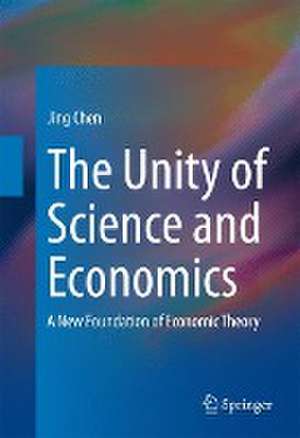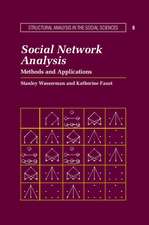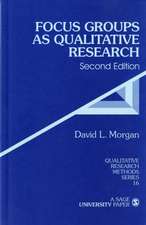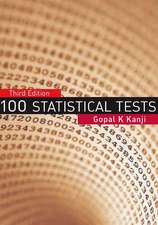The Unity of Science and Economics: A New Foundation of Economic Theory
Autor Jing Chenen Limba Engleză Hardback – 9 noi 2015
The theory presented in this book shows that there do not exist universally optimal policies or institutional structures. Instead, the impacts of different policies or social structures have to be measured within the context of existing levels of resource abundance. As the physical costs of extracting resources rise steadily, many policy assumptions adopted in mainstream economic theories, and workable in times of cheap and abundant energy supplies and other resources, need to be reconsidered. In this rapidly changing world, the theory presented here provides a solid foundation for examining the long-term impacts of today's policy decisions.
| Toate formatele și edițiile | Preț | Express |
|---|---|---|
| Paperback (1) | 464.18 lei 6-8 săpt. | |
| Springer – 23 aug 2016 | 464.18 lei 6-8 săpt. | |
| Hardback (1) | 526.67 lei 6-8 săpt. | |
| Springer – 9 noi 2015 | 526.67 lei 6-8 săpt. |
Preț: 526.67 lei
Preț vechi: 619.62 lei
-15% Nou
Puncte Express: 790
Preț estimativ în valută:
100.78€ • 107.77$ • 84.03£
100.78€ • 107.77$ • 84.03£
Carte tipărită la comandă
Livrare economică 18 aprilie-02 mai
Preluare comenzi: 021 569.72.76
Specificații
ISBN-13: 9781493934645
ISBN-10: 1493934643
Pagini: 125
Ilustrații: XVI, 136 p.
Dimensiuni: 155 x 235 x 15 mm
Greutate: 0.4 kg
Ediția:1st ed. 2016
Editura: Springer
Colecția Springer
Locul publicării:New York, NY, United States
ISBN-10: 1493934643
Pagini: 125
Ilustrații: XVI, 136 p.
Dimensiuni: 155 x 235 x 15 mm
Greutate: 0.4 kg
Ediția:1st ed. 2016
Editura: Springer
Colecția Springer
Locul publicării:New York, NY, United States
Public țintă
ResearchCuprins
Major Factors in Biological and Social Systems.- Resource and Technology.- Production: A Mathematical Theory.- Languages and Cultures: An Economic Analysis.- The Entropy Theory of Mind.- The Entropy Theory of Value: A Mathematical Theory.- Epilogue: Pioneer Species and Climax Species.
Textul de pe ultima copertă
This book presents a new economic theory developed from physical and biological principles. It explains how technology, social systems and economic values are intimately related to resources. Many people have recognized that mainstream (neoclassical) economic theories are not consistent with physical laws and often not consistent with empirical patterns, but most feel that economic activities are too complex to be described by a simple and coherent mathematical theory. While social systems are indeed complex, all life systems, including social systems, satisfy two principles. First, all systems need to extract resources from the external environment to compensate for their consumption. Second, for a system to be viable, the amount of resource extraction has to be no less than the level of consumption. From these two principles, we derive a quantitative theory of major factors in economic activities, such as fixed cost, variable cost, discount rate, uncertainty and duration. The mathematical theory enables us to systematically measure the effectiveness of different policies and institutional structures at varying levels of resource abundance and cost.
The theory presented in this book shows that there do not exist universally optimal policies or institutional structures. Instead, the impacts of different policies or social structures have to be measured within the context of existing levels of resource abundance. As the physical costs of extracting resources rise steadily, many policy assumptions adopted in mainstream economic theories, and workable in times of cheap and abundant energy supplies and other resources, need to be reconsidered. In this rapidly changing world, the theory presented here provides a solid foundation for examining the long-term impacts of today's policy decisions.
Caracteristici
Presents a new economic theory linking basic biophysical principles to decision making by individuals and institutions Provides an integrated understanding of the social, biological, and physical aspects of economic systems Includes a detailed analysis of practical policy options and social structures in a world of increasing resource costs Features an economic analysis of human mind and scientific theories Presents an entropy theory of mind for a unified understanding of resources, information processing, and economics Includes supplementary material: sn.pub/extras















